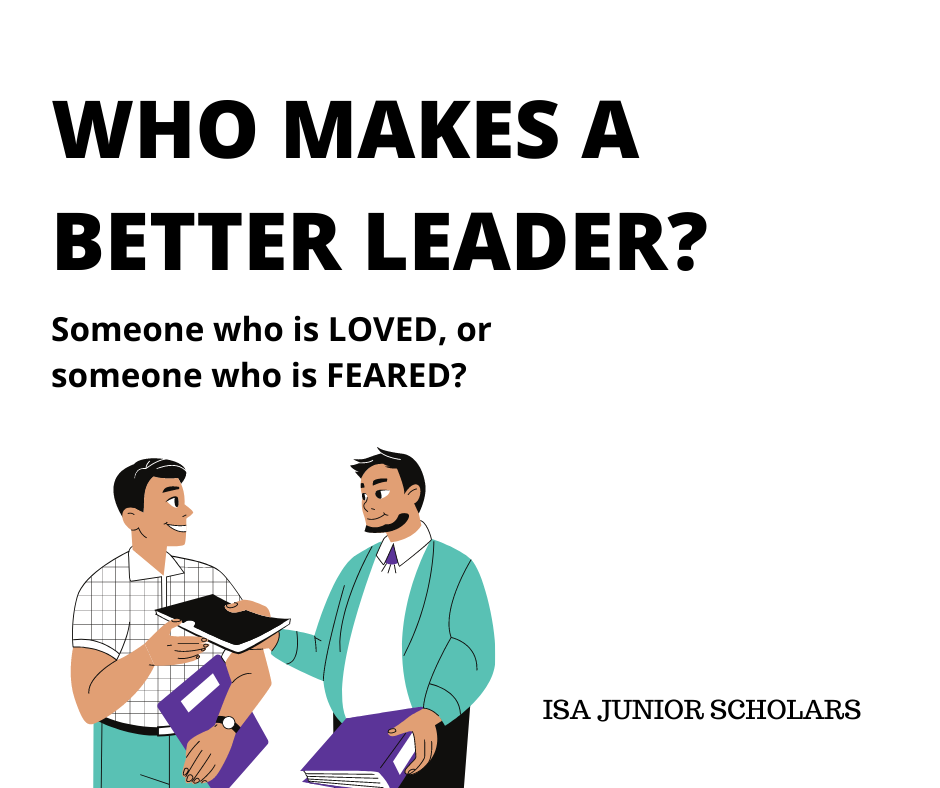By Patricia Gaille Tiu (Grade 10 – Luna)
“And here comes in the question whether it is better to be loved rather than feared or feared rather than loved. It might perhaps be answered that we should wish to be both; but since love and fear can hardly exist together, if we must choose between them, it is far safer to be feared than loved.”
“Love is preserved by the link of obligation which, owing to the baseness of men, is broken at every opportunity for their advantage; but fear preserves you by a dread of punishment which never fails.” – Niccolo Machiavelli in The Prince Chapter XVII
Before delving deeper into what makes a better leader, let’s first ask the question: What is generally considered as “better”? Is it the achievement of productivity goals? Or is it focusing on the wellbeing of its stakeholders despite the end results?
The 15th century political theorist Machiavelli believed that a leader must be feared but not hated if he could not be both feared and loved. A natural cynic of human nature, he viewed people as fickle and unreliable, only willing to help when danger is distant. His infamous work The Prince would influence the likes of Hitler and Stalin who utilized fear as their greatest weapon in bringing about the imperilment of the masses.
You could say that Machiavelli idealized the philosophy that “the ends justify the means”; hence, as long as the state is thriving and order is in place, then morally ambiguous methods to achieve this goal are justifiable. Critics would argue that as policies in effect of this idealism may infringe upon human rights, the idea alone is unacceptable.
On the other hand, prominent leaders in history such as Martin Luther King and Mahatma Gandhi were loved by their peers and respected for their will while their messages still speak out to the masses up to this day. Taking these comparisons at face value, both love and fear clearly appear to be effective motivators of human nature. Therefore, how can we determine whether one is more effective than the other?
The focus on individualism has been emphasized in the modern age, prioritizing the basic human rights of society and its members. If modern business corporations would utilize fear to instill discipline on its workers, overstepping certain boundaries may count as an entrenchment of human rights which would negatively impact the corporation’s reputation and operations. Being loved, on the other hand, may be misconstrued as a weakness that could be exploited.
Despite Machiavelli’s cynical views on humanity, I find that his outlooks on a leader contradict those of the human being. If the latter could be capable of trust and betrayal, and thus be unpredictable, how could a leader only assume the trait of a singular faction? It paints the leader to be entirely one-dimensional without considering the idiosyncrasies of the human entity. It is true that the ideal leader must be both feared and loved; however, the extremities of either should not be present in an effective leader.
If we ask ourselves what makes the two motivators so effective, the common ground would be a sense of respect. Let’s say there’s a school project and one has been assigned as a leader. The leader sets up strict deadlines for each member and enforces a rule that non-compliance would be taken to the facilitator; therefore, a member learns to fear the implications of not cooperating. If the leader is able to effectively enforce discipline in achieving their goal, this will beget respect from the members. On the other hand, a loved leader may be one who gives consideration to the members, acknowledging issues that the members themselves cannot control. With this, the members feel as if they are heard, urging them to respect their leader and comply to the best of their ability.
A leader must be able to perform a variety of roles and wear the appropriate hats for certain situations. He/she cannot be limited or kept in a box as what Machiavelli points out. While a loved leader is admired and respected by all, fear balances this out by intimidating those who step out of line by enforcing discipline and order. Therefore, a “better” leader is able to accomplish his/her goals, but not at the expense of his/her members. He/she must acknowledge that the goal must include the wellbeing of his/her subordinates.
Thus, to answer the question: the better leader is one who is multifaceted, intuitive, and able to adapt to any situation. He/she must know when to be feared and when to be loved.

